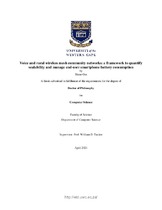| dc.contributor.advisor | Tucker, William D. | |
| dc.contributor.author | Om, Shree | |
| dc.date.accessioned | 2021-04-09T08:30:03Z | |
| dc.date.available | 2021-04-09T08:30:03Z | |
| dc.date.issued | 2021 | |
| dc.identifier.uri | http://hdl.handle.net/11394/8174 | |
| dc.description | Philosophiae Doctor - PhD | en_US |
| dc.description.abstract | Community wireless mesh initiatives are a pioneering option to cheap ‘last-mile’ access to network services for rural low-income regions primarily located in Sub-Saharan Africa and Developing Asia. However, researchers have criticized wireless mesh networks for their poor scalability; and scalability quantification research has mostly consisted of modularization of per-node throughput capacity behaviour. A scalability quantification model to design wireless mesh networks to provide adequate quality of service is lacking. However, scalability quantification of community mesh networks alone is inadequate because rural users need affordable devices for access; and they need to know how best to use them. Low-cost low-end smartphones offer handset affordability solutions but require smart management of their small capacity battery. Related work supports the usage of Wi-Fi for communication because it is shown to consume less battery than 2G, 3G or Bluetooth. However, a model to compare Wi-Fi battery consumption amongst different low-end smartphones is missing, as is a comparison of different over-the-top communication applications. | en_US |
| dc.language.iso | en | en_US |
| dc.publisher | University of Western Cape | en_US |
| dc.subject | Wireless networks | en_US |
| dc.subject | Rural area | en_US |
| dc.subject | Smartphone battery consumption | en_US |
| dc.subject | Use of smartphones | en_US |
| dc.subject | Voice traffic | en_US |
| dc.title | Voice and rural wireless mesh community networks: a framework to quantify scalability and manage end-user smartphone battery consumption | en_US |
| dc.rights.holder | University of Western Cape | en_US |

